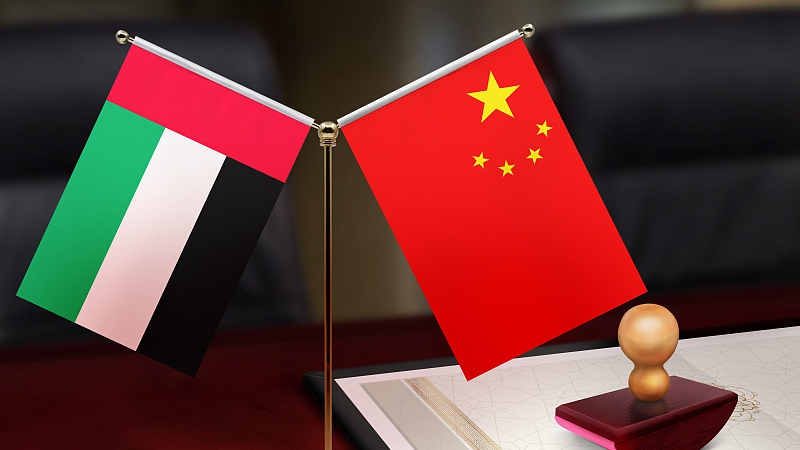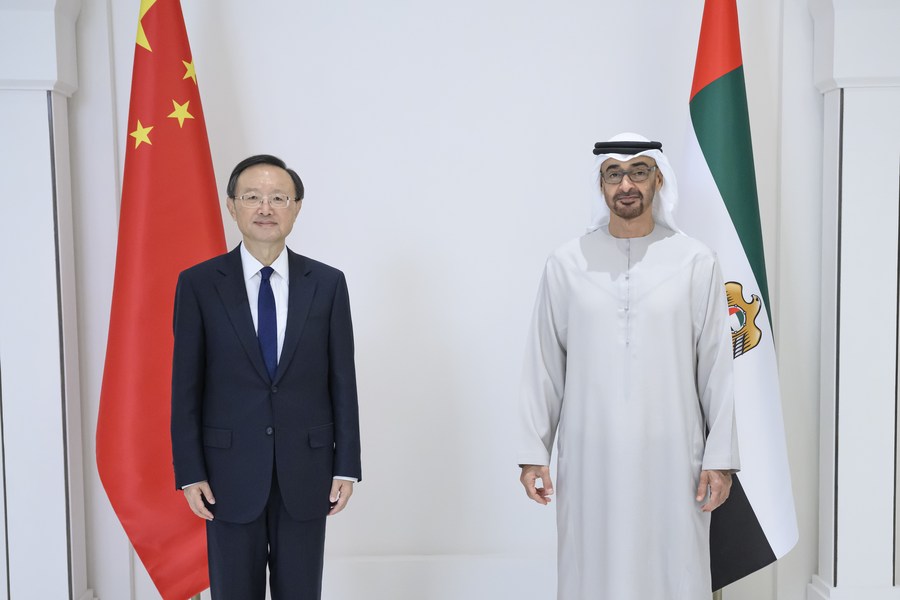
Editor's note: Hannan Hussain is a foreign affairs commentator and author. He is a Fulbright recipient at the University of Maryland and a former assistant researcher at the Islamabad Policy Research Institute. The article reflects the author's opinions and not necessarily the views of CGTN.
On July 1, President of the United Arab Emirates (UAE) Sheikh Mohamed bin Zayed Al Nahyan met with visiting senior Chinese diplomat Yang Jiechi, underscoring the strengths of their comprehensive strategic partnership and opportunities for expanded cooperation. UAE occupies a unique place, given its role in China's deepening Belt and Road Initiative (BRI) engagements, and a foundation of political trust that signals space for extensive South-South cooperation.
Highly favorable trends in bilateral trade and year-by-year exports strengthen the case for diversifying cooperation further in high potential domains. For instance, stepped-up engagement in civil aviation and energy sectors is warranted given positive domestic momentum in both sectors. The other merit is history: UAE has been a key player in initiating several China-related projects in the Gulf over the years, strengthening the basis for diversifying cooperation in the post-pandemic era.
Regionally, China remains resolutely focused on opposing interference in UAE's internal affairs, while the latter values its long-term goal of stepping-up multi-sector economic potential. Both fronts would likely benefit as China affirms the Gulf country as its priority in Beijing's Middle East diplomacy. A shared sense of future progression in investment, economy, trade, technology, healthcare, environment, among others, further reinforces it.
Understand that strong diplomatic support is vital to that sense of future strategic progress. Sheikh Mohamed's characterization of the China-UAE strategic partnership as holding "extraordinary importance" sends a message of assurance to scores of Chinese and UAE businesses that have a future stake in both countries' impressive trade volume.

President of the United Arab Emirates (UAE) Sheikh Mohamed bin Zayed Al Nahyan (R) meets with Yang Jiechi, a member of the Political Bureau of the Communist Party of China (CPC) Central Committee and director of the Office of the Foreign Affairs Commission of the CPC Central Committee, in Abu Dhabi, the United Arab Emirates, July 1, 2022. /Xinhua
President of the United Arab Emirates (UAE) Sheikh Mohamed bin Zayed Al Nahyan (R) meets with Yang Jiechi, a member of the Political Bureau of the Communist Party of China (CPC) Central Committee and director of the Office of the Foreign Affairs Commission of the CPC Central Committee, in Abu Dhabi, the United Arab Emirates, July 1, 2022. /Xinhua
Abu Dhabi's positive engagement with Beijing on a quickly evolving digital economy, and support for specific areas of practical cooperation agreed in January, have served to advance important legwork for cooperation in traditional as well as non-traditional sectors.
Going forward, a key enabler of the China-UAE comprehensive strategic partner will be the economic and strategic choices involved in boosting the partnership in the post-pandemic era. To their credit, ties have fared successfully during a significant course of the pandemic itself. There is also vast latitude to align specific development strategies that inform China's BRI as well as the UAE's Designing the Next 50 plan.
In late March, Chinese President Xi Jinping made an important observation that because of the joint efforts of both sides, "the China-UAE comprehensive strategic partnership has been consolidated and upgraded continuously, and their friendly cooperation in various fields has reached the highest level in history." Thus, maintaining a high frequency of diplomacy at present promotes interests that have elevated bilateral ties to historic highs in the past.
Finally, exploring new cooperation highlights beyond traditional China-UAE engagement sectors could give a nod to much-needed South-South progression. Its prospects, expressed by Yang during the visit, deserve more optimism when we factor China's success in nurturing political commitments in other parts of the world, and using that foundation to support results that favor South-South cooperation.
An even stronger China-UAE comprehensive strategic partnership can help eliminate barriers in that cooperation realm, given welcome trends in UAE's recent diplomacy towards the South, and the United Nations' recommendation of more targeted and specific goals to facilitate the cause of South-South cooperation.
UAE's demonstrated support for China's Global Development Initiative (GDI) during the visit serves to advance strategic interests towards the South-South domain for two reasons. First, GDI is unique in attaching profound value to such engagement. Second, cooperation coordinated in light of GDI's goals can further strengthen the foundations of China-UAE multisector cooperation, particularly by enriching key aspects of the strategic partnership.
In sum, Yang's exchange with Sheikh Mohamed bin Zayed Al Nahyan sets the stage for expanding cooperation into non-traditional fields, reinforces both countries' place in regional diplomacy, and makes clear that the partnership will surely contribute to the Middle East's long-term peaceful and development.
(If you want to contribute and have specific expertise, please contact us at opinions@cgtn.com. Follow @thouse_opinions on Twitter to discover the latest commentaries in the CGTN Opinion Section.)

